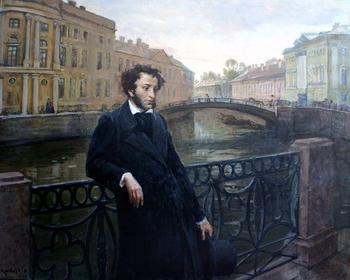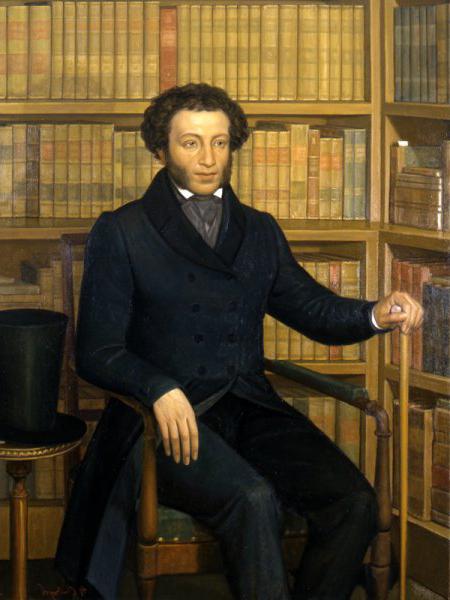Pushkin's poems from childhood are known to each of us. First, we hear pleasant lines from the lips of the parents, then, having learned to read, slowly we begin to independently comprehend their exciting rhythm, trying to guess the elusive meaning and meaning. The lyric work "The Conversation of the Book Seller with the Poet" refers to the mature period of the work of Alexander Sergeyevich, when he realized the desire to earn his living as a writer. The difficulties he encountered, including a lack of understanding of others, gave rise to numerous thoughts and served as an incentive to write a poem. In the work, the author tries to understand how to proceed further. The article provides a detailed analysis of it.
“The conversation of the bookseller with the poet”, perhaps, will prompt the thoughtful reader to think about the eternal, will make him rethink his values.
Composition of the poem
The lyrical work is structured in such a way that it is more convenient for the reader to perceive it: the stanzas of the poet's and the bookseller’s answers alternate and form together a solid dialogue that seems endless. To understand the idea of this mysterious conversation, you need to be able to plunge into its essence, to feel for yourself the main motives of Pushkin, to recognize the depth of his lyrics.
Reading, we often begin to empathize with the poet, we take his side. This condition occurs when the addressee finds some harmony of his life with those thoughts and feelings that the author is talking about.
The status of the lyrical hero
Pushkin created the “Conversation of the Book Seller with the Poet” with special trepidation and put a lot of personal experiences into it. Although the lyrical hero is confident in dialogue, he really doubts himself. The conversation resembles a verbal duel, where the truth is either on one or the other side. The poet makes many arguments precisely because he is trying to prove to the world the importance and significance of genuine art. He wants to serve real literature, to become a voluntary word artist.

The bookseller is in no hurry to argue with him, he only puts forward quite reasonable arguments, shows what is important to society. The poet’s sensitive soul craves new impressions: he needs “wonderful dreams”, deep thoughts and aspirations as air. This can be understood by analysis. “The conversation of the bookseller with the poet” shows the purpose of the man of art, his role on earth: to serve as his talent for the world, although contemporaries are not always ready to accept the talent addressed to them.
Freedom theme
Perhaps this is the key moment, the center of the "duel" of the exalted dreamer with the average man. The poet writes, based on inspiration, the payment for him is secondary. The interlocutor believes that freedom is impossible without money, as analysis shows. “The conversation of the bookseller with the poet” reveals the vital relationship of a talented person with the world, shows how vulnerable and strong he is at the same time. One who is endowed with extraordinary talent is like a white swan: gigantic wings prevent him from walking on the ground, but in heaven he is powerful and great.

Pushkin, "The Conversation of the Book Seller with the Poet," wrote to show the tremendous power of a creative person: he can bear a lot. The most important thing for him is truth. For freedom, a true poet is willing to pay any price, even if it significantly exceeds his real earnings. The author gives the writer the voice of eternity, emphasizes his aspiration for the future and the desire to serve the muse.
Bookstore Intent
Anyone who is involved with publishing, looks at creativity from the opposite side. It matters not so much the strength and grandeur of talent, but the question of whether the work will be sold. If commercial success is not expected, then no one will take risks and invest in the promotion of a dubious project. The bookseller is able to calculate the profit from his work, and for him the degree of success and popularity of the author is fundamental, because he earns money on this. A book for him is a commodity and a source of income.
Pushkin's poems, as always, are filled with special psychologism and drama. The author of these lines emphasizes the inevitable suffering of the creative person, his difficulties on the path to the formation of the writer.
Feelings of the poet. Analysis
“The conversation of the bookseller with the poet” affects the deep personal experiences of Alexander Sergeyevich himself, reflects the degree of his desire to express himself in the work. Often the desire for self-expression is accompanied by rejected love, misunderstanding on the part of society and even loved ones. If it seems to someone that this is very easy, let him try to experience all these dramas, which are often capable of devastating so much that many people would give up much sooner. However, people capable of art are as viable as they are talented.
Freedom is the main aspiration of the poet, of any creative person, because only in this state can one truly create and feel infinitely happy. For her talents are willing to pay very dearly.
General meaning
The poem "The Conversation of the Book Seller with the Poet" contains a deep philosophical meaning. It raises important questions about the meaning of life and the destiny of man on earth. The conversation between the writer and the publisher turns into an eternal debate, which continues to this day. The work does not lose its relevance today, when the issue of promoting young authors is very acute, some of them are forced to print at their own expense.